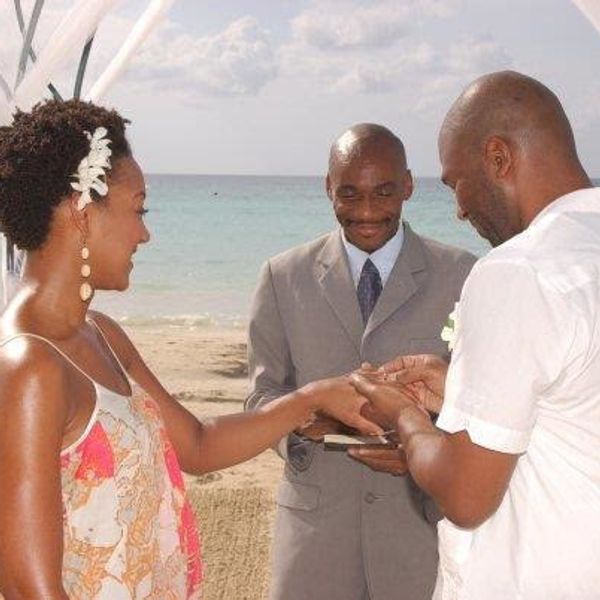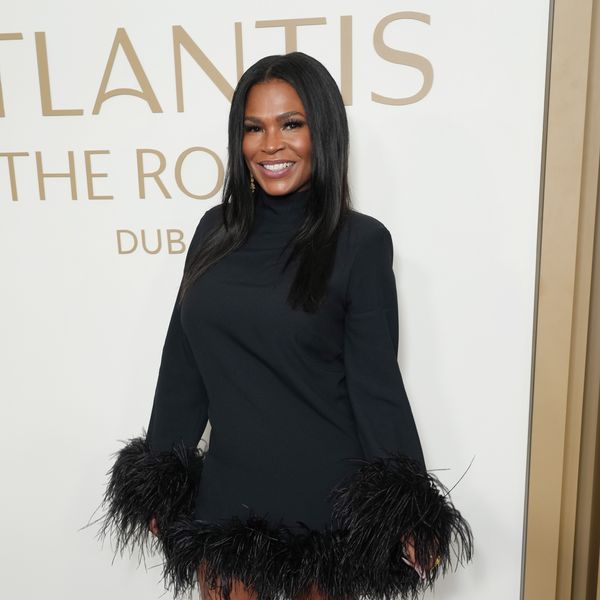
My husband and I have always been a practical pair.
In matters of the heart, practicality often comes up as the victor, even ahead of logic. What has always rang most true for us is what works best for us. We don't follow the law of the land, instead, we make our own. This year marked the tenth year anniversary since my husband and partner of 16 years said “I do."
Even then, he and I took the practical approach. While every bride-to-be is consumed with wedding planning details, racking up wish list items on gift registries, solidifying venues, choosing plate options for their guests of 25+ - he and I might of wanted some of that, but knew we didn't need any of it. We were the same couple who started living together as soon as a month into dating, just because it made the most sense with maximizing our income in New Orleans, where we grew up.
It was three years into our relationship when we revisited the conversation around what it would look like to build a life together. Although it included marriage, it also included home ownership.
We got really real with one another and knew we could not do both.
Neither one of us came from money. In fact, he was swimming in college debt, as was I. And when we visited a mortgage broker, I learned I was the victim of identity theft for eight years. My first lesson in credit was when I learned a relative burned mine down to a score of 345 out of 800.
Once we learned this information, all of our energy was focused on repairing my credit and any wedding plans were placed on the shelf. We were focused, and our end goal was home ownership. We decided owning a home made the most sense, especially not knowing the future of our young relationship. We decided the best plan of action would help both of us level up, and if our partnership fizzled, we'd at least walk away with more funds in our bank accounts.
That was always the plan for our relationship, to not lock one another in and to instead position both of us to end up better than we were when we found one another.
Introduction to Investing
After seven months of working with our realtor to purchase our dream fixer upper in our favorite New Orleans neighborhood, we closed and called the home ours. Two days later, we learned Hurricane Katrina was on the way, and we evacuated a day later, leaving our fully furnished apartment and our not yet inhabited first house.
A year later—11 years ago to date, in fact—he proposed when we returned to have our house gutted in New Orleans. It was the sweetest end to a stressful trip. A year after that, we eloped.
It seemed selfish and a bit financially reckless to host a grandiose party or to put our friends in a position to travel from wherever they evacuated and landed after Katrina to join us for a wedding. The thought of having people purchase dressy clothes and shoes, spend money on hair, makeup, travel, and gifts felt absurd. So we put the kibosh on that, ordered our first passports, and left for Negril, Jamaica.
To be fair, we decided not to invite anyone. As soon as that decision was made, I released the greatest sigh of relief. I purchased my non-traditional wedding dress from the Armani outlet store for $35. My childhood girlfriend gifted me with earrings. The husband purchased a white guayabera shirt and wore pants he already owned. We could wear all the items again and as many times as we wanted. And we skipped the purchase of shoes because a beach wedding was happening.
I also didn't want to make any decisions about the day. Guys typically don't have to decide anything. And after planning events in my career before, I just didn't want to have to be on duty for my special day. And I didn't have to. The resort had a 30-minute checklist we'd complete.
Playing the Long Game
I said it then and have said it several times since my wedding day, eloping was the best decision we made to walk into the next chapter of our relationship. Our two weeks in Negril totaled to $5,000. My paternal family sponsored our flights with points. The groom's family covered half the cost of our time in Jamaica and it was the only time we ever asked them for support.
It was the easiest and most sustainable decision to have a weddingmoon, instead of two separate and way more expensive events. As a practical pair, the husb and I always plan for the long game.
And here we are, a decade later, still making fiscally responsible decisions, growing stronger together, and we'll be moving into our fifth real estate investment in about three months.
Christine Moline is a New Orleans born, Austin-based productivity consultant and digital organizer with Dashboard Priorities. She explores and offers sustainable strategies to help others maximize their resources—such as time, energy and finances—to put themselves first.
- 10 Things You Could Buy With The Money You'd Save By Eloping ›
- Want to save money on your wedding? Why not elope? - NY Daily ... ›
- Couples Who Elope Enjoy the Party Later - Field Notes - The New ... ›
- Elope Abroad - How to Create an Elopement Budget and Save Money ›
- 21 Couples Who Decided To Elope And Are Damn Glad They Did ... ›
- Can You Save Money Eloping? Here Are 5 Ways! - Wedding for $1000 ›
- Want a Fabulous Wedding? Consider Eloping - The New York Times ›
- Eloping: 7 Biggest Do's and Don'ts | Brides ›
- We Eloped & Saved a Ton of Money ›
We have less than 40 days left in 2024, and while I'm not one to rush goals just because it's the end of the year, it can be fun to challenge yourself to think about ways you'll close out this year big.
Whether you're planning to meet a certain financial or fitness goal, or you're simply trying to maintain and build on the progress you made this year, having something to look forward to is always a good look. Setting actual goals, according to research, actually leads to more success than just playing things by ear. So here are a few to get you started, sis:
(Disclaimer: Not everything is for everyone, so do like my Granny always says: "Eat the meat. Spit out the bone." Take on five out of the 40 and focus on that for the remainder of the year, or do them all. Either way, this is just to get you started.)
40 Ways To End The Year Strong and Inspired
Money Moves

Riska/Getty Images
1. Increase your retirement (or other savings/investment) contributions by 1%.
Experts have found that you could be leaving money on the table by not upping your contributions when you can.
2. Cancel two to five subscriptions.
You could be missing hundreds, even thousands, of dollars a year due to sneaky price hikes and "updates."
3. Create a "fun" in a high-yield savings account.
This is especially important if you struggle with the dreaded b-word (budget) and will make next year's efforts a lot less intimidating. Even if it's $10 a month, do it.
4. Put on your big-girl panties, and set up automatic transfers and payments for at least one bill.
It reduces the stress of managing bills, lessens the chance of a missed payment---and the fees that come with that---and there can be cost savings for doing so.
5. Invest in a cleaner or housekeeping service.
Bosses who value their time (and mental health) invest their dollars into areas where the time they'd spend doing those tasks themselves could be better used to focus on other money-making projects. (And yes, rest is part of that.) Get a housekeeper, sis, or drop off that laundry, even if it's once per month.
6. Donate to a charity.
Beyond the tax benefits, it's a win-win for the greater good of communities you care about.
7. Review your insurance policies and negotiate a better rate (or move on) before their end dates.
Experts often agree this is a small but mighty step to take each year, especially since insurance rates are competitive, you could be spending more money than you need to (or not enough) and your insurance rates can affect your mortgage payments.
8. Call your loan provider and refinance.
As interest rates fall, “millions of borrowers may be able to refinance and get more affordable payments. As interest rates eased down to 6.5%, about 2.5 million borrowers could already refinance and save at least 75 basis points (0.75%) on their interest rate,” the Consumer Financial Protection Bureau reports. You can also refinance student and other types of loans.
9. Stop buying individual items and stock up via going bulk.
Research has found that, among 30 common products, buying in bulk could save you 27% compared with buying in lower quantities. Water, paper products, and baby products like diapers, toiletries, and garbage bags are the top items where people see the most cost-effectiveness. (This has been a lifesaver for me—children, large family, or not—especially when it comes to toothpaste, deodorant, toilet paper, and feminine hygiene products, saving stress, time, and money.)
10. Go cash-only for the holidays.
If you set smart goals and stick to limits on things like gifts, going out to eat, or groceries, you'll see the benefits of this. Cash-stuffing is one method recommended, but something as simple as taking a $10 bill out for lunch, disabling that card for an hour, and leaving your card in a safe place at the office can give you that mindset jump start to see how far you can take your money without the need to splurge.
Love And Romance
11. Say "no."
There are clear mental and physical health benefits to saying no including the setting of healthy boundaries, creating time and energy for other self-care activities, and protecting yourself from physically harmful situations (i.e. unprotected sex or abuse). Just say it, clearly and simply, when you need to.
12. Set a fun, free, adults-only date night for once a week or twice a month with your spouse.
If busy, high-profile folk have touted the success of this, even you can make the time for quality time with your partner. And it's even better when it costs nothing. The best connections are made doing something chill, challenging, or outside the usual dinner-and-a-movie date. Play a game that allows you to reconnect, take a walk in your neighborhood to chat and laugh, or try a little erotic chocolate/edible liquid/paint episode a la Mea Culpa.
13. Go out with Mr. or Ms. "Not My Type."
I love my man, but if I were waiting out for my "type" at the time, we wouldn't be celebrating seven (going on eight) years together. Sometimes having strict, unrealistic expectations for a spouse (especially related to things like height, physical features, or career path) is what's keeping you alone and lonely.
Take the pressure off and explore all your options. I'm not telling you to stop popping the balloon on the guy who earns $20,000 less than you if that's a hard no that Jesus himself told you to skip. I'm asking you to explore other options and see what else God might have out there for your love journey.
14. Immediately apologize and pray together.
I've learned that always being "right" isn't always ideal when you truly care about someone and you're in a relationship for the long haul. Defaulting to an apology when necessary, even when things aren't 100% resolved, is a good way to prioritize peace and save your energy for more worthwhile battles. Research has even supported the benefits of apologies in relationships, and how couples married for five or more years do it often.
15. Get a Rose and discover true self-love.
Do I really have to explain this? You've gotta know what satisfies you, and how better to figure that out than to practice self-love in the bed by yourself? You can also try this with a partner, but as a woman who got on this train very much later in my sexual activity journey. I have a lot more learning to do on my own, and even in a satisfying relationship, I like to find out new things about myself, by myself.
Figure out what you're into, watch what you want to watch, and read what you want to read to define pleasure for yourself. There's a freedom and empowering element there especially if you're used to prioritizing pleasing your partner.
16. Be direct and have the "money talk" with bae.
Money issues are one of the leading causes of divorce, so you need to have those conversations before you even think about marrying someone. And true, nobody can predict the future so you won't be able to avoid some challenges altogether, however, talking with your potential spouse about how they view money, their spending habits, and the pain points in terms of their approach to money management can at least give you a glimpse into what's in store if you do walk down the aisle, move in with them, or decide to share a bank account/business/child with them.
17. Invest in the "paid" version of that dating app.
I know plenty of successful, married folk who did this and met "the one" as a result. Let's be honest: The free version is for playing around. I had a lot of fun with my "free" profile back in the day, trust me. Upgrade that photo, profile, and package, and see if the quality of your dating adventures changes when you're serious about finding a true partner. Dating coaches and matchmakers cosign this.
18. Solo travel to meet that long-distance connection.
Sometimes, your perfect match isn't within 100 miles of you, and that's okay. Make it an adventure, enjoy the memories, and book that ticket. I met my man this way and it's been a whirlwind escape ever since. If you're not comfortable traveling solo, travel or (network to plan travel) with a group via Facebook.
Career And Business

Riska/Getty Images
19. Schedule coffee or virtual meetups with smart people from your graduating class, previous employer, or current employer.
I have gotten many freelance opportunities by doing this. It's as simple as connecting and offering value (or simply learning how you can better equip yourself to do so.) It's also a great way to expand your network, spark new friendships, or find out about new job opportunities.
20. Invest in a well-made suit.
I don't care what industry you're in, a suit says "power," and it's not as old-school or out-of-style as you'd think. Plus the whole experience of looking for a new one (or getting one tailored) is fun and affirming. Try these options. I swear, anytime I wear a blazer, I'm treated like a celebrity or boss, especially when traveling. I was once upgraded to first-class wearing a yellow blazer outfit, and the airline professional literally said, "You look like somebody important. Here you go."
21. Volunteer for a worthwhile project or cause that's important to your company.
If you're overworked and underappreciated, skip this one, but if you truly have the time, love what you do, and want to advance, this move is clutch. Volunteering for extra projects got me where I am today in media because I had foresight, and knew that was the only way at the time to leverage relationships, and I was able to challenge myself to learn skills that 20 years later are still bankable. That VP you can't get a meeting with will be at that gala your company is planning, so join that committee, sis.
22. Write down why you deserve a raise and ask for it in your next one-on-one.
Gather those receipts (ie sales increase numbers, KPIs met, deals closed, people acquired via recruitment, the impact of systems updates, or other tangible success metrics) and ask for that raise before the first or second-quarter budgets are being finalized.
23. Instead of quitting, write down your exit plan.
While revenge quitting is set to be a thing next year (and maybe you're among those who will be leading the trend), try the better boss move and quit with a real plan.
24. Start automatically separating that estimated self-employed quarterly tax estimate.
If you have side hustles (or you're collecting 1099 income,) baby, you do not want to neglect those quarter tax payments. Talk to a professional, do your research, and set up automatic transfers to an account specifically for paying these at the appropriate due dates.
25. Sign up for a free one- to 11-week course related to your industry—or the industry you want to be in next year.
Institutions like Harvard University and platforms like Coursera offer free courses that can enhance your skills. You can also invest in certificate courses with accredited colleges as well as tech training.
26. Hit "Easy Apply" for 10 dream jobs listed on LinkedIn.
While you shouldn't solely rely on this when actively job-seeking, using this convenient LinkedIn option is a great way to get into the habit of applying for positions. And if you're already employed, you should still be "dating" other employers if you're looking to make a move in the next six months. Keep your interview skills sharp, practice toughening up for the "nos," and get a bit of an ego boost in the process.
Self-Care And Wellness
27. Pre-schedule three month's worth of massages.
Oftentimes this is cost-effective since some spas offer deals for multiple bookings. Also, it makes an act of self-care deliberate and important, not an option. When you get that reminder call, you'll know it's real.
28. Fire that therapist and try another one.
Cultural competency in mental health support is one major problem that can hinder Black women from even bothering with therapy. And who wants the added stress of spending multiple, paid sessions explaining why something is a microaggression? Cut the cord and move on to try someone else, either via a Black women therapists channel or recommendations from others.
29. Join a small group at church.
Bedside service ain't gonna cut it and neither is going to the usual Sunday service. Join a smaller group and upgrade your efforts to connect, network, and elevate spiritually. Even if virtually, take a step to dig a bit deeper with more targeted Bible study and discussions.
30. Say no, even to loved ones.
This is on here twice, for a reason. Saying no is the simplest, most powerful micro-action you can take today to make 2025 better. No explanations. No guilt. Say no.
31. Choose one "luxury" beauty product for skincare and stick to it.
This was trending big on social, especially for millennials hitting their 40s. There's just something so freeing about not giving in to every trend and sticking to the basics that work, especially when there are quality, healthy ingredients involved. Put those orders on auto-renew.
32. Sign up for a new sport or fitness class just for fun, not for results.
It's great to be on a weight-loss or weight-lifting journey, but try something just for the fun of it. Switch things up with a couple of these fitness activities.
33. Book a staycation.
Leave the passport at home and explore a nearby community or another town in your state. There's so much enrichment in your own backyard right here in the U.S., and you don't even have to break the bank.
34. Pre-schedule your mammograms, Pap smear, and peri-menopause checkups for next year.
Take control of your health by pre-scheduling essential appointments like mammograms, Pap smears, and peri-menopause check-ups for 2025. Prioritizing these screenings early ensures you stay on top of your wellness and make time for self-care in the new year.
35. Cut off support of beauty and wellness professionals whose customer service is below standard.
This is another one that many Black women have been vocal about—from unrealistic pre-appointment requirements, to booking fees, to long waits, to unsavory in-salon experiences. Spot the red flags early, and just stop accommodating foolishness. Support salons or experienced stylists who are kind, have proper systems in place and value your time.
36. Schedule five to 10-minute moments of silence on your calendar.
Again, wellness is not optional, and if it's not on my calendar, it's not official. Sit quietly. Pray. Meditate. Or do nothing. The benefits of silent moments are almost endless.
37. Download a meditation app.
If you've found that meditation is difficult to schedule or to even start, an app can help. Try this, this, or this one, and take that step to embrace something new to enhance your wellness routine. If you're tired of downloading apps, create a playlist for meditation via Amazon Music or Spotify and schedule a reminder to do it once a day or week.
38. Invest in a healthy meal prep or delivery service.
Time is emotionally expensive, so save as much of it as possible. Getting into meal prep to keep to your goals is a great way to save time, stress, and effort. The health benefits of meal prepping have also been proven via research.
39. Create a positive playlist on Spotify, Amazon Music, YouTube, or other streaming platform.
It can be podcasts, music, affirmations, or somatic sounds. It's a game-changer. You can even set an alarm to wake you up to start your day with the positive playlist. Not into creating your own? There are plenty to choose from with a quick search.
40. Set up reminders for Alexa (Siri or other AI) to remind you, "You are loved," and "You are okay."
This simple effort can boost your endorphins and remind you that you're indeed, not alone, and you will be okay, regardless. To set mine up, I simply commanded, "Alexa, remind me everyday 'Jesus loves me,'" and like clockwork she does. She almost scared the ish out of me one day when I'd forgotten the reminder was active, but it was the reminder I needed when anxiety had gotten the best of me that week.
Let’s make things inbox official! Sign up for the xoNecole newsletter for love, wellness, career, and exclusive content delivered straight to your inbox.
Featured image by
The List Of Golden Globes Awards Nominees Has Dropped: Who's Nominated & Who Got Snubbed
The Golden Globes started the week off with a bang announcing the 2025 nominees and per usual we are rooting for everybody Black.
The film Emilia Pérez, featuring Zoe Saldaña, leads the Golden Globe nominations with 10 nominations, while The Brutalist has seven. For television, The Bear received the most nominations with five, followed by Only Murders in the Building and Shōgunwith four each. Before we celebrate our people, we must also acknowledge the snubs.
The Golden Globes, and other award organizations, have faced criticism for overlooking Black-led films, particularly after it was revealed in 2021 that the voting body lacked Black representation.
The Hollywood Foreign Press Association, despite recent efforts to diversify, has faced criticism for overlooking acclaimed performances by Black actresses. This year, Marianne Jean-Baptiste and Danielle Deadwyler were notably absent from the nominees, despite their award-winning roles in Hard Truths and The Piano Lesson, respectively. Danielle's omission marks the second time she has been snubbed by the Globes for a critically acclaimed performance.
Give our girl her things — she more than deserves them!
- YouTubewww.youtube.com
According to the Golden Globes, “In 2023, UCLA highlighted that Black actors make up 14.8% and 16.2% of all theatrical and streaming roles. However, we’ve seen many success stories that have inspired multiple generations. Black people in the entertainment industry have seen great strides in advancement in the creative arts that have helped evolve our everyday reality.”
And like my therapist always reminds me: two things can be true at once. Yes, Black thespians are represented more in the entertainment industry AND we still have lots of work to do as we fully live out the dreams of our ancestors.
The 82nd ceremony will be broadcast on January 5 on CBS and Paramount+. Find the full list of Black nominees below, including the category for which they are nominated:
Film
- Cynthia Erivo (Best Performance by a Female Actor in a Motion Picture – Musical or Comedy) for her role in Wicked
- Zendaya (Best Performance by a Female Actor in a Motion Picture – Musical or Comedy) for her role in Challengers
- Colman Domingo (Best Performance by a Male Actor in a Motion Picture – Drama) for his role in Sing Sing
- Denzel Washington (Best Performance by a Male Actor in a Supporting Role) for his role in Gladiator II
- Zoe Saldaña (Best Supporting Actress in a Motion Picture) for her role in Emilia Pérez
- Kris Bowers (Best Original Score) for the film The Wild Robot
Television
- Donald Glover (Best Performance by a Male Actor in a Television Series) for his role inMr. and Mrs. Smith
- Quinta Brunson (Best Performance by a Female Actor in a Television Series – Musical or Comedy) for her role in Abbott Elementary
- Ayo Edebiri (Best Performance by a Female Actor in a Television Series – Musical or Comedy) for her role in The Bear
- Jamie Foxx (Best Performance in Stand-Up Comedy on Television) for Jamie Foxx: What Had Happened Was
Let’s make things inbox official! Sign up for the xoNecole newsletter for love, wellness, career, and exclusive content delivered straight to your inbox.
Featured image by Emma McIntyre/Getty Images for Academy Museum of Motion Pictures












